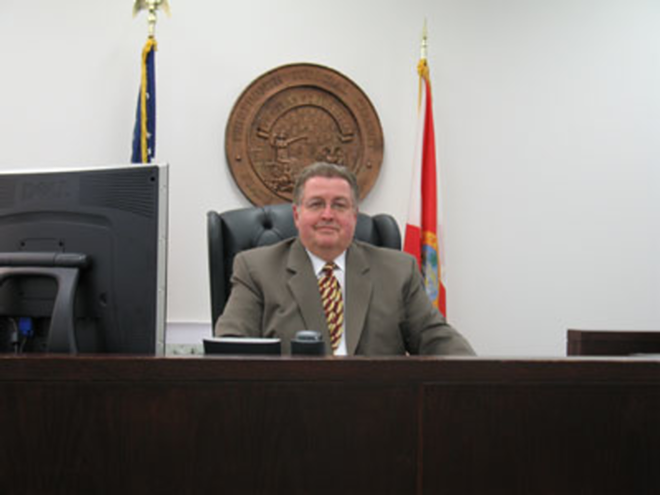
There are two types of people that show up to Hillsborough County's night traffic court: confident, indignant citizens clutching envelopes and poster-sized diagrams, relishing a chance to fight the Man to prove their innocence; and the poor saps sitting with heads bowed, already defeated, hoping the hearing officer will show mercy and reduce their fine.
On a recent night, both archetypes are represented by a disparate group of 25 or so county residents who appear at Tampa's traffic court, located in the former Floriland Mall off of Busch Boulevard, to contest their traffic tickets. The civil traffic cases heard tonight are but a small portion of the 70,000 that pass through Hillsborough County's court system each year. And while many things divide these motorists — age, race, income, type of traffic violation — they all hope to draw the golden pass: the police officer who does not show up.
"One of my friends said to take the chance because the cop might not show," says Chase Cobrin, a University of South Florida student. "But I'm not banking on it."
That's why he brought the envelope full of printed digital photos to prove he couldn't see the red light he ran last October. And while he won't deny that he coasted through that light on Fletcher Avenue after stopping for minute, he's hoping the traffic hearing officer will "use a little bit of discretion."
"I'm just hoping the judge takes it easy," he says. "A $170 ticket is ridiculous for what I did."
At 6 p.m. the bailiff, bald and frowning, directs everyone inside Courtroom F1, a drab space with off-white walls and uncomfortable wooden benches. There are already several police officers sitting in the benches, all smiles and joking with one another.
Hearing officer Damon Glisson, who has been overseeing traffic cases for the last 16 years, appears in a grey suit and sits at his broad desk. After a short education on courtroom procedures — police present their case first then the defendant— he swears the entire courtroom in ("Do you promise to tell the truth, the whole truth and nothing but the truth?") and the parade of jilted drivers begins: single moms cited for speeding, teenagers pleading for leniency and Mercedes drivers arguing passionately about how they didn't run that red light.
"It may have turned red at some point, but I did not think it was red," one elderly man contends.
It's a lame excuse and Glisson immediately finds him guilty. Same with the pony-tailed man in a tattered T-shirt who says his car was sputtering and couldn't make it through a yellow light in time.
"It's not a legal defense," Glisson explains to the man. "It's an excuse."
In Glisson's courtroom, there are excuses and then there are better excuses. And most nights, neither convince him. Like when 25-year-old Justin Lawrence insists the police officer who cited him for speeding is wrong.
"I didn't speed that day," Lawrence insists, throwing up his hands. "But it's my word against his."
"And the radar," Gilsson reminds him.
Glisson is no hard-nose. He's quick with a smile and keeps his lectures to a minimum. He won't even tell me the craziest defense he's ever heard, because he doesn't want to embarrass anybody. But no person receives a free pass in his court. Police officers must meet certain criteria, too, for a speeding violation to stick: the speed limit of the road, the officer's visual estimation of the speed before he brings out the radar, and documentation that the radar has been checked for accuracy in the last six months.
But Glisson's thorough questioning of the officer doesn't make Lawrence feel better. If he receives five more violations, in his lifetime, his license will be suspended for five years. Lawrence sneers as he leaves the courtroom, ripping up his citation and slamming the door on his way out.
By 8 p.m., after nearly two hours of ticket talk, fatigue suffuses the courtroom. The police officers slouch, scratch their heads and yawn. They've heard most of these excuses before.
"From 'I'm late' to 'Someone in my family died,' you hear them all," one deputy with grey flecks in his hair says.
Some people do have good reasons, he says, but most of them are bad excuses. And he's not in the business of sorting them out.
"I try to be as sensitive as I can, but I have an obligation to keep the streets of Hillsborough County safe," he says.
Another deputy, fresh-faced C.P. Hollis, rushes out of the courtroom after the defendant in his case doesn't show.
"I dread [coming here], because it's my day off," he complains. "I'd rather be with my family."
Although the vast majority of people that come to traffic court are found guilty, a few squeak by.
One mousy young woman in a grey business suit, cited for failing to come to a complete stop at a four-way intersection, gives a unique defense: Two drunken homeless men were yelling at her when she left a nearby apartment complex late one October night. She was nervous, talking on the phone with her boyfriend and didn't feel comfortable stopping.
Glisson is convinced, and the young woman walks away with no fines.
At the end of the night, nine more people sit anxiously in the courtroom, but there are no more police officers left to testify. People trade glances with one another. A few of them understand right away and smile broadly. The procession starts: Glisson calls each remaining name, asks if the defendant wants to dismiss the case because the officer is not present — everyone, surprisingly enough, says yes — and sends each one home.
Cobrin is one of the last to be called up, and he leaves with the biggest smile of them all.
"I didn't expect that," he says on his way out of the courtroom. "This is pretty lucky stuff."
Find out the five things Alex learned in court.

